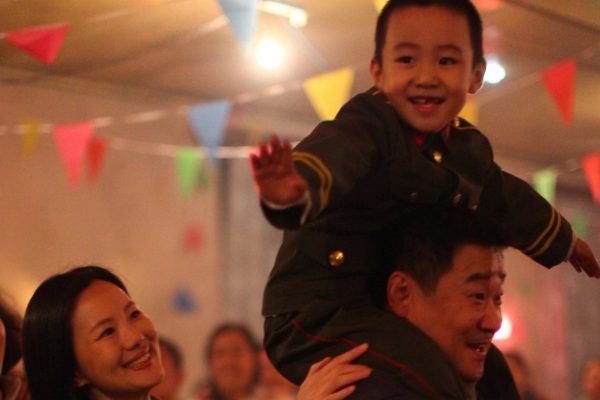An odd piece of complementary timing: the release of Wang Xiaoshuai’s So Long, My Song occurs only weeks after Nanfu Wang and Jialing Zhang’s documentary One Child Nation arrived in the UK. Both films are “about” China’s one child policy, a reactionary piece of Communist Party doctrine which, in the name of saving the economic and industrial future of the country, disallowed couples from giving birth to more than one child. One Child Nation delves into the personal effects of the policy on co-director Nanfu Wang’s family, placing her and her loved-ones’ feelings in the context of a gargantuan propaganda campaign; So Long, My Son by contrast works by sitting with the consequences of a single instance of the policy’s enactment.
The film begins with a scene heavy with dread, steadying itself for calamity. A group of young boys are playing by a reservoir. A chill wind is blowing. It’s worth heeding the adumbration: a child drowns. From there on the film weaves its way between the two families connected by this tragedy, going in and out of flashbacks as the drama demands. The boy’s parents, Liyun (Yong Mei) and Yaojin (Wang Jingchun), move away from the Northern factory town to Fujian province, and raise an adopted son, named after the son who died. The couple are recuperating not only from their son’s death but also the forced termination of Liyun’s pregnancy, organised by a close family friend (and director of the factory’s Family Planning Committee), Haiyan (Ai Liya), whose son was there when his friend drowned.
The film’s manner of moving between past and present is surprising and affecting, but occasionally troublesome are scenes in which the dialogue acts as a place-marker, each character explicitly stating not only the sense of the scene but their relation to it. (This can be mistaken for directness, and while it’s certainly helpful that a long film provides a viewer with timely reminders, it does interrupt the finely arranged rhythms of the scenes in question.) There’s also the slightly film school-ish way Wang underlines the drama of some scenes: in one, a character is beaten and harassed while a kettle boils in the background; in another, an argument plays out while a sewing machine churns away; in another still, the main characters sit miserably in their dark flat while fireworks and firecrackers roar in the distance. Would these scenes lose anything by omitting these sounds? Plainly, no, they wouldn’t.
And yet it’s easy to forgive this habit of Wang’s, since the shot that follows the fireworks is a small masterpiece: it’s a new year, and while Liyun and Yaojin hole up in their apartment together, their friends are celebrating — this is first seen through a window, the frosted glass blurring the vivid colours and warm feelings of the party, all the while the camera dollies towards the brightness as snow descends in front of it. It’s a wonderful example of Kim Seok-kim’s calm cinematography at its best, which wouldn’t look out of place in a film by Terence Davies.
Moment to moment, shot to shot, scene to scene, Wang is wending his way to a final hour loaded with both enormous emotional strength and accompanying tact, and the film begins to encourage comparison with the work of Jia Zhangke, especially in how it situates its characters in a moment of continuous and rapid change. Near the end, an act of reconciliation occurs in a hospital corridor, echoing two ominous shots earlier in the film, and the scene becomes practically tremulous with emotion. By this point So Long, My Son has amply proved how rich it is, how moving is it, and by its end, how graceful, too.
At Filmhouse Edinburgh Until Thu Dec 12 2019.
